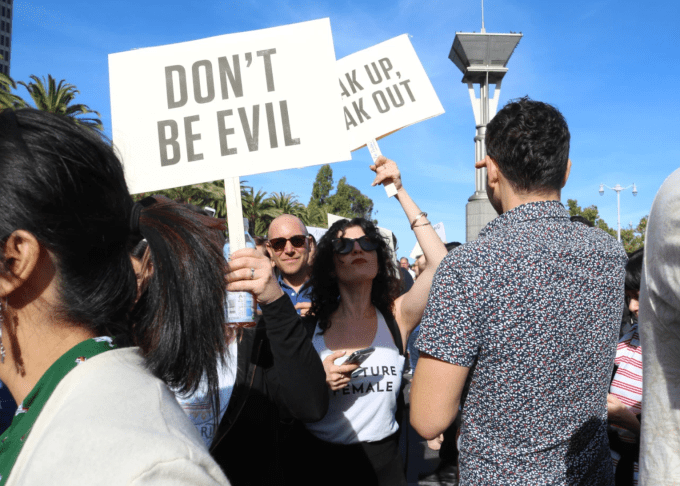Tech Nuggets with Technology: This Blog provides you the content regarding the latest technology which includes gadjets,softwares,laptops,mobiles etc
Sunday, December 1, 2019
Biocon Biologics to reduce the cost of human insulin and cancer drugs
Influencers and brands find new ways to collaborate after Instagram removes 'like'
Inside the shady world of upstart Chinese cryptocurrency exchanges like MXC, whose pump and dump schemes may have prompted China's latest crypto crackdown (Shuyao Kong/Decrypt)
Shuyao Kong / Decrypt:
Inside the shady world of upstart Chinese cryptocurrency exchanges like MXC, whose pump and dump schemes may have prompted China's latest crypto crackdown — The recent hardline stance on crypto seems to signal “blockchain not bitcoin.” That's wrong. Here's why China is cracking down on some exchanges—but not all of them.
Here's All You Need to Know About Cyber Monday 2019
A look at the Masakhane project, which aims to translate African languages using neural machine translation by working with AI researchers across the continent (Khari Johnson/VentureBeat)
Khari Johnson / VentureBeat:
A look at the Masakhane project, which aims to translate African languages using neural machine translation by working with AI researchers across the continent — English, Arabic, and French dialects can be found on parts of the African continent and are used across tribes, ethnic groups …
Millions of SMS messages exposed in database security lapse
A massive database storing tens of millions of SMS text messages, most of which were sent by businesses to potential customers, has been found online.
The database is run by TrueDialog, a business SMS provider for businesses and higher education providers, which lets companies, colleges, and universities send bulk text messages to their customers and students. The Austin, Texas-based company says one of the advantages to its service is that recipients can also text back, allowing them to have two-way conversations with brands or businesses.
The database stored years of sent and received text messages from its customers and processed by TrueDialog. But because the database was left unprotected on the internet without a password, none of the data was encrypted and anyone could look inside.
Security researchers Noam Rotem and Ran Locar found the exposed database earlier this month as part of their internet scanning efforts.
TechCrunch examined a portion of the data, which contained detailed logs of messages sent by customers who used TrueDialog’s system, including phone numbers and SMS message contents. The database contained information about university finance applications, marketing messages from businesses with discount codes, and job alerts, among other things.
But the data also contained sensitive text messages, such as two-factor codes and other security messages, which may have allowed anyone viewing the data to gain access to a person’s online accounts. Many of the messages we reviewed contained codes to access online medical services to obtain, and password reset and login codes for sites including Facebook and Google accounts.
The data also contained usernames and passwords of TrueDialog’s customers, which if used could have been used to access and impersonate their accounts.
Because some of the two-way message conversations contained a unique conversation code, it’s possible to read entire chains of conversations. One table alone had tens of millions of messages, many of which were message recipients trying to opt-out of receiving text messages.
TechCrunch contacted TrueDialog about the exposure, which promptly pulled the database offline. Despite reaching out several times, TrueDialog’s chief executive John Wright would not acknowledge the breach nor return several requests for comment. Wright also did not answer any of our questions — including whether the company would inform customers of the security lapse and if he plans to inform regulators, such as state attorneys general, per state data breach notification laws.
The company is just one of many SMS providers that have in recent months left systems — and sensitive text messages — on the internet for anyone to access. Not only that but it’s another example of why SMS text messages may be convenient but is not a secure way to communicate — particularly for sensitive data, like sending two-factor codes.
Read more:
- A leaky database of SMS messages exposed two-factor codes
- Mixcloud data breach exposes over 20 million user records
- StockX was hacked, exposing millions of customers’ data
- DoorDash confirms data breach affected 4.9 million users
- Stop saying, ‘We take your privacy and security seriously’
- Capital One breach also hit other major companies, say researchers
- Macy’s said hackers stole customer credit cards — again
Week in Review: Apple’s rebirth as a content company has a forgettable debut
Hey everyone. Thank you for welcoming me into you inboxes yet again.
Hope you all had a wonderful Thanksgiving. After dodging your inboxes for a couple weeks as I ventured off to China for a TechCrunch event in Shenzhen, I am rested up and ready to go.
If you’re reading this on the TechCrunch site, you can get this in your inbox here, and follow my tweets here.
The big story
When Apple announced details on their three new subscription products (Apple TV+, Apple Arcade and Apple News+ — all of which are now live) back in March, the headlines that followed all described accurately how Apple’s business was increasingly shifting away from hardware towards services and how the future of the company may lie in these subscription businesses.
I largely accepted those headlines as fact, but one thing I have been thinking an awful lot about this week is how much I have loved Disney+ since signing up for an account and just how little I have thought about Apple TV+ despite signing up for both at their launches.
It’s admittedly not the fairest of comparisons, Disney has decades of classic content behind them while Apple is pushing out weekly updates to a few mostly meh TV shows. But no one was begging Apple to get into television. The company’s desires to diversify and own subscriptions that consumers have on their Apple devices certainly make sense for them, but their strategy of making that play without the help of any beloved series before them seems to have been a big miscalculation.
At TechCrunch, we write an awful lot about acquisitions worth hundreds of million, if not billions, of dollars. Some of the acquisitions that have intrigued me the most have been in the content space. Streaming networks are plunking down historic sums on series like Seinfeld, Friends and The Big Bang Theory. The buyers have differed throughout these deals, but they have never been Apple.
That’s because Apple isn’t bidding on history, they’re trying to nab directors and actors creating the series that will be the next hits. And while that sounds very Apple, it also sounds like a product that’s an awfully big gamble to the average consumer looking to try out a new streaming service. Why pick the service that’s starting from a standstill? Apple has ordered plenty of series and I have few doubts that at least one of the shows they plan to introduce is going to be a hit, but there isn’t much in the way of an early favorite yet and for subscribers that haven’t found “the one” yet, there’s very little reason to stick around.

Other networks with a half-dozen major series can afford a few flops because there’s a library of classics that’s filling up the dead space. Apple’s strategy is bold but is going to lead to awfully high churn among consumers that won’t be as forgiving of bad bets. This is an issue that’s sure to become less pronounced over time, but I would bet there will be quite a few consumers unsubscribing in the mean time leaving those on freebie subscriptions responsible for gauging which new shows are top notch.
Apple has also made the weird move of not housing their content inside an app so much as the Apple TV’s alternative UI inside the TV app. One one hand, this makes the lack of content less visible, but it also pushes all of the original series to the back of your mind. If you’re a Netflix user who has been subconsciously trained never to use the TV app on your Apple TV because none of their content is housed there, you’re really left forgetting about TV+ shows entirely when using the traditional app layout.
We haven’t received any super early numbers on Apple News+, Apple Arcade or Apple TV+, but none of the three appears to have made the sizable cultural splashes in their debuts that were hoped for at launch. Apple’s biggest bet of the three was undoubtedly TV+ and while their first series haven’t seemed to drop any jaws, what’s more concerning is whether the fundamentals of the service have been arranged so that unsatisfied subscribers feel any need to stick around.
Send me feedback
on Twitter @lucasmtny or email
lucas@techcrunch.com
On to the rest of the week’s news.

Image via AMY OSBORNE/AFP/Getty Images
Trends of the week
Here are a few big news items from big companies, with green links to all the sweet, sweet added context:
- Facebook buys a game studio building Light saber Fruit Ninja
One of the things I wrote about this week was Facebook buying the game studio behind one of virtual reality’s most popular titles, Beat Saber. No details on a price tag for the deal, but the buy brings the hop IP underneath Facebook’s corporate umbrella which seems poised to be eying more VR content acquisitions. - Twitter plans for account memorials
Almost any time Twitter decides to make a big product change, one gets the feeling it was either snuck through or brute-forced by the CEO or another exec. That’s because there often doesn’t seem to be a lot of consideration for caveats that users seem to collectively identify almost immediately. This week was time for another one of these situations, after Twitter announced it was planning to deactivate old unused Twitter accounts en masse, something users realized was just going to lead to deactivating deceased people’s accounts and erasing what they had ever tweeted. Twitter, to their credit, decided to pause and rethink things.
GAFA Gaffes
How did the top tech companies screw up this week? This clearly needs its own section, in order of badness:
- Google appears to bring the hammer down on activism:
[Google employee activist says she has been fired]
Disrupt Berlin

It’s hard to believe it’s already that time of the year again, but we just announced the agenda for Disrupt Berlin and we’ve got some all-stars making their way to the stage. I’ll be there this year, get some tickets and come say hey!
- Learn how to win customers and influence consumers
- Three of the best tackle the thorny issue of Brexit for startups
- Learn how to raise your first Euros
Sign up for more newsletters in your inbox (including this one) here.
That time a monkey flew to the edge of space and then smashed into a destroyer
Update: It's the last day of Thanksgiving weekend in the US, meaning most Ars staffers are navigating traffic as opposed to potential stories. With folks off for the holiday, we're resurfacing this odd bit of a space history from the archives—a look at the adventures of Sam the rhesus monkey, which began 60 years ago this week on December 4, 1959. This story first ran in February 2017, and it appears unchanged below.
-

This is Sam. He lived in America.
Sam the rhesus monkey had already experienced one hell of a ride to the edge of space when he splashed down into the Atlantic Ocean—but his adventure didn’t end there. Although the dry, original accounts of Sam's 1959 flight offer scant detail about the journey, mainly confirming that NASA’s new Mercury capsule kept him alive, Bob Thompson tells a more colorful story.
Now in his early 90s, Thompson can still dominate a room with his commanding voice. And on a recent January morning, standing in his kitchen, Thompson did just that as he recounted the landing of Sam nearly six decades ago. In doing so, he offered a parable for NASA as it considers rescue operations for its Orion spacecraft at sea.
A look at China-based MiningLamp, a Palantir-like startup that provides analytics tools to China's police and 200+ of Fortune 500, for an actionable information (South China Morning Post)
South China Morning Post:
A look at China-based MiningLamp, a Palantir-like startup that provides analytics tools to China's police and 200+ of Fortune 500, for an actionable information — MiningLamp's business analytics tools are used by more than 200 companies in the Fortune 500 Like Palantir …
Airtel to raise mobile call, data charges by up to 42%, details here
Windows 10 free upgrade still works for users and you could be one of them
When Microsoft released Windows 10, there was a window of time during which users with a legitimate copy of Windows 7 or Windows 8 could upgrade to Windows 10 for free. Microsoft ended the free upgrade program a long time ago, however, With the end of life for Windows 7 round the corner, users have once again found a way to get a free upgrade to Windows 10.
According to a post by WindowsLatest, the process of getting a free upgrade to Windows 10 is surprisingly simple. All you need to do is download the Windows Media Creation Tool on the system running a genuine copy of Windows 7, 8 or 8.1. Run the tool to download a copy of Windows 10 and start the installation. Enter your license key for the copy of Windows you are running and you should be able to install Windows 10 without paying for the upgrade. According to the website, a reddit user claiming to be a former Microsoft employee has also confirmed that he free upgrade continues to work.
In the event that you plan to do a clean install, you apparently won't have to worry. On performing a clean install, Windows 10 should activate on its own. During the install, just don’t enter your older license key as the 7-character keys are converted to a 10 character key that gets linked to your Microsoft account.
The alleged former Microsoft employee states in his reddit post that “WDG didn’t care pretty much at all because Terry Meyerson at the time cared more about his upgrade stats than license revenue as Windows isn’t Microsoft’s cash cow anymore. It’s the same stance back in the day where Microsoft would allow Windows Updates on pirated copies of Windows 7 as the bigger picture was to thwart security threats based from those copies.”
Microsoft had terminated the original upgrade program back in July of 2016. Users were still able to get an upgrade thanks to the “assistive upgrade program,” which was officially closed on December 31, 2017, marking the end to all the ways of getting a free upgrade to Windows 10. Turns out, users can still get their system upgraded to Windows 10 as long as you’re running a genuine copy of Windows 7, 8 or 8.1. IF you’re still in need of an upgrade, this might be a good time to start before Microsoft plugs this loophole.
Vodafone Idea Announces Increased Prepaid Tariffs: All You Need to Know
Apple AirPod Pro production being doubled amidst unprecedented demand
Apple introduced the AirPods originally in 2016, with a refresh being announced in 2019. In the three years of their existence, the AirPods have become a “must-have” accessory for iPhone users. However in 2019, people expected more than just a refresh. They expected ANC, perhaps a new design. Then Apple went ahead and launched the AirPods Pro, a pair of in-ear monitors with active noise cancellation and for sure, a brand new design. Apple had finally replaced the hard plastic you’d have to put in your ears with soft silicon tips, making the AirPods Pro a lot more comfortable to use. Turns out, the new iems from the Cupertino company have been wildly popular.
A recent report by Bloomberg is now claiming that Apple is doubling its production, from 1 million units to 2 million. The report is further substantiated by a secondary report by Nikkei that has followed the supply-chain has also confirmed the doubling of the production. The report added how the wait times for the new AirPods Pro is much higher than for the regular AirPods, which are available for next day delivery.
The AirPods Pro offer all the features that are expected from a modern-day truly wireless IEM. Featuring active noise cancellation and a battery life of 4.5 hours with noise cancellation turned on. In conjunction with the battery case, Apple says users can expect up to 24 hours of use, which is impressive whichever way you look at it. For comparison sake, the Sony WH-1000XM3 have a claimed battery life of up to 30 hours.
The Apple AirPods Pro have a price tag of Rs 24,900 in India, but they are not yet available in India.
Sources: after five Thinking Machines staff left, investors are rattled, potentially impacting fundraising; two researchers quit via Slack during an all-hands (The Information)
The Information : Sources: after five Thinking Machines staff left, investors are rattled, potentially impacting fundraising; two researc...
-
http://bit.ly/2XqNIDz
-
Amrith Ramkumar / Wall Street Journal : An interview with White House OSTP Director Michael Kratsios, a Peter Thiel protégé confirmed by ...
